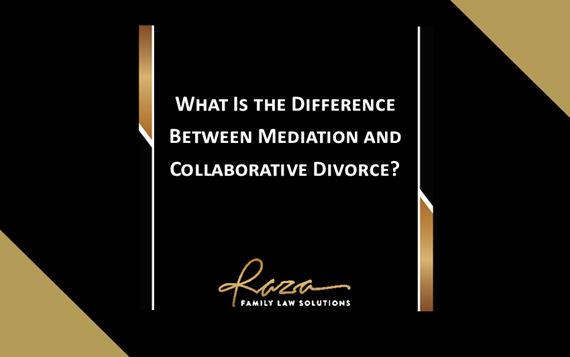The choice between mediation and collaborative law for your divorce depends on your specific situation and what you and your spouse feel most comfortable with. Both mediation and collaborative law are alternative dispute resolution methods that aim to resolve divorce issues outside of court, but they have different approaches.
Mediation:
- Neutral Third Party: In mediation, a neutral third party, known as a mediator, helps facilitate communication and negotiation between you and your spouse. The mediator does not make decisions for you but assists you in reaching agreements.
- Control: You and your spouse have more control over the process and the outcome of your divorce. You make the decisions on issues like child custody, asset division, and support.
- Cost and Speed: Mediation is often quicker and less expensive than going to court. It can be a more efficient process.
- Cooperative: It is generally a more cooperative and less adversarial process, which can be beneficial if you want to maintain an amicable relationship with your spouse.
Collaborative Law:
- Team Approach: In collaborative law, you and your spouse each have your own attorney, and you work with other professionals like financial advisors, child specialists, and therapists. The goal is to reach mutually beneficial agreements.
- Commitment to Settlement: All parties involved, including the attorneys, commit to working toward a settlement. If the process fails and you end up going to court, both attorneys must withdraw from the case.
- Legal Representation: You have the benefit of legal representation throughout the process, ensuring your rights and interests are protected.
- Structured Process: Collaborative law offers a structured process that may be helpful for complex divorces with significant assets or highly emotional issues.
Choosing Between Mediation and Collaborative Law:
To decide between mediation and collaborative law for your divorce, consider the following:
- Communication: If you and your spouse can communicate reasonably well and are willing to work together, mediation may be a good choice. If communication is strained, collaborative law might be more suitable due to the involvement of legal professionals.
- Complexity: For complex financial situations or high-conflict divorces, collaborative law’s team approach can provide more comprehensive support.
- Budget: Consider your budget. Mediation is often less expensive than collaborative law, but costs can vary based on your location and the complexity of the issues.
- Legal Representation: If you both want or need legal representation, collaborative law ensures that you have attorneys by your side.
- Commitment to Resolution: In both cases, both you and your spouse need to be committed to finding a resolution outside of court. If either party is intent on litigating, these methods may not work.
Ultimately, the decision should be based on your unique circumstances, your relationship with your spouse, and your preferences. You may also want to consult with an attorney who specializes in divorce or a mediator to discuss your options and get advice tailored to your situation.
At Raza Family Law Solutions, we practice family law effectively guiding clients through prenuptial and post nuptial agreements, dissolution of marriage, modifications of prior judgments, and resolving child custody disputes. We also help families take a different approach to divorce with mediation and collaborative work. Contact us for a consultation at (314) 314-5505.




